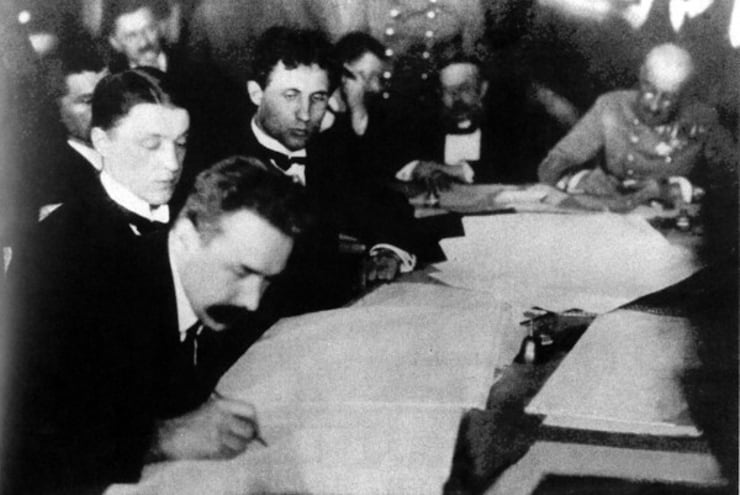Děkuji za článek. 
3.3.1918 The Powers concluded the Peace of Brest-Litovsk
Categories: First World War , Calendar

He pitted the ideology of Trotsky and Lenin against each other. The Peace of Brest-Litovsk played an important role in the history of Russia and Europe. The agreement was signed 103 years ago.
After the October Revolution in the autumn of 1917, Russia no longer wanted to continue the war. The Russian front was practically falling apart, which Germany and Austria-Hungary took advantage of to attack. They are reclaiming territory that the Tsarist powers had previously taken from them. These were the present-day territories of Poland, the Baltics, Ukraine and Transcaucasia. Russia was thus forced to sign the Peace of Brest-Litovsk in March 1918.
It showed a clear discrepancy between the revolutionary idealism of Leon Trotsky and the power-political pragmatism of V. I. Lenin. The former refused to sign the aforementioned agreement at the beginning of 1918. This would have led to the surrender of several territories to Germany. Lenin took the opposite view, endorsing the concessions in the interests of defending the power that the Bolsheviks had gained under his leadership in Russia. The dispute between Trotsky and Lenin was finally resolved by developments on the front.
"After the subsequent rapid advance of Germany far to the east, peace was finally signed on March 3, 1918, at the cost of even greater concessions than Trotsky had previously refused. As a result, there was talk from the beginning of a shameful surrender," writes Jan Eichler in From Sarajevo to Hiroshima.
Both sides had their selfish motives in signing the Peace of Brest-Litovsk on 3 March 1918. Lenin and his followers got out of the war so that they could concentrate fully on consolidating their power in Russia. Germany, for its part, sought to be able to move all its armed forces from the eastern front to the western front. Lenin defended his actions in February 1918 by saying that Russia was defenceless and was in danger of being crushed by German forces, though he himself admitted that it was a bestial and shameful peace.
The peace also had longer-term international political implications. Mainly, it was the source of the Bolshevik government's entirely negative attitude towards the whole post-warinternational order, and consequently the isolation of Soviet Russia in post-war Europe. "And so, in the end, the Bolshevik government became a victim of its own social construction. When its notions of peace did not materialize, it preferred to voluntarily isolate itself from the rest of the world of the time. The search for a way back then became all the more painful and difficult," says political scientist Jan Eichler.
The second, more serious impact of Lenin's approach to peace, he says, was the reaction of key European countries - both defeated and victorious. But especially Germany. All of them distrusted Russia, eventually even supporting military interventions to help overthrow the Bolshevik government...
Jan Eichler: From Sarajevo to Hiroshima. War and Places in the First Half of the 20th Century
Rudolf Gajda: My Memoirs
www.encyclopediaofukraine.com
The article is included in categories:



